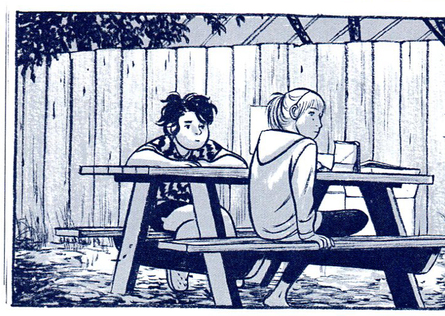It’s been a tough one, boys and girls. I’m not gonna lie. I have most certainly run out of “give-a-fucks” here for my last semester at CSC. Soon, I’ll officially be a college-educated fool. I’ve done a lot of typing over the semester. Blogs, tweets, papers, comments, etc. etc. I suppose I should feel somewhat grateful since I type about eight hundred million miles faster than I can hand write anything. That being said, as part of our DigiLit final, we were asked to go back through our blogs and comments and analyze them. Find some commonalities, some changes, some surprises, etc.
So, for the final time, let’s get this freakshow on the road.
 Photo CC-by Marc Palm, tangentially relevant
Photo CC-by Marc Palm, tangentially relevant
Repeat Offenses
A lot, and I mean, a lot of my blog posts this semester tackled problems I found in my own and in others’ education. I’m definitely not a proponent of traditional “sit down and shut up” classroom etiquette. We need to shake things up, identify alternative strategies, and figure out how to incorporate them into classrooms. The problem here is the immense amounts of bullshit teachers have to deal with. Curricula being designed for them, not by them, as well as stuffy administration or government mandates requiring they continue to recycle the same busted-ass methods are doing no one any favors. Oh, that’s another common thread: I despise closed-mindedness, tradition for tradition’s sake, and pretty much anything remotely resembling an authority figure imposing its will over others. I’m so edgy (this is sarcasm).
Another thread that joins a lot of my posts and comments together is a contrarian viewpoint. Call me a hipster, call me a douche, whatever, but in most facets of our education this semester, I did my best to look from all angles, and not just take everything at face value. Sure, I can read 15 articles and listen to 12 TEDTalks about how this new innovative idea is so great and will change the world, but I don’t need a pat on the back, and I don’t need idealism. I need results. I need proof. If you want me to believe that your idea is fullproof, I’m going to try to find the holes that can be poked in it and see how you plug them. I’m not trying to be edgy or be “that guy,” I’m really just trying to cover all bases here. A great idea is great.. in theory. Can it hold up to practice? Can it hold up to peer review? These details do matter. Ideas are good. Acting on them is better.
Photo CC-by Sean MacEntee
Takeaway Points
A key point that a few of my blogs mentioned that I feel is worth mentioning again is that we need to abandon the fetishizing of ideas and of innovation. People walk away from TEDTalks feeling good and optimistic for the future, mostly because somebody else has a good idea. What TEDTalks have you actually put into practice? Good for them, they’ve reached a successful point in a career and are coming to share their results with us. What does that do for us if you don’t act on it? If you don’t incorporate it into your own life in some way more than a Facebook share and a “oh hey this was really cool”? I’m a hypocrite, because I think talk is cheap. Words are my favored medium, and still, I get tired of them from time to time. I get tired of soapboxes and causes. I want something I can see – not yet another person like me, rambling on but doing little in practice to implement any differences.
Hypocrisy aside, that’s one of my favorite things about these weekly blogging exercises. I’ve got a week’s worth of Tweets, articles, blog posts, and so much more bubbling in my brain, and I’ve gotta let it out in some manner. I also, oddly enough, love attention. My blog is my soapbox. I can write about social injustice and feel less like a shit person when I fail to notice instances of it in entertainment because, hey, I wrote about it! It’s like the whole “being an asshole concept,” where people believe that by somehow prefacing being a dick by “Hey, I’m kind of a dick,” that makes whatever offensive thing said okay. I feel like writing is one of the few things I can feasibly do to make a difference. I can at least raise awareness about causes. That’s something, right? I like to pretend so. It makes me feel better about myself.
Photo CC-by Sean Carpenter
Ch-ch-ch-changes
One thing I noticed as the year went on, in my blog posts, my bravado and usual “funny sarcastic guy” schtick began to fall in favor of unfiltered cynicism or flat out boredom. I won’t lie, certain blog posts this semester just did not have my attention. They were definitely cranked out for the sake of an assignment. As we went, I became more and more aware of my own flaws, more conscious about the things I didn’t like about myself or my work, and rather than try to cover them up with a fascade of humor, instead decided to let the truth be the truth. I’m thankful for my education here. I’m thankful for the things I’ve learned, the people I’ve met, and the things I’ve seen. Still, I’m left with a sour taste in my mouth at the end of the day. Do teens really need to commit 4 years of their life and thousands of dollars of money they don’t have for what is essentially a repeat of a high school education? The government sure wants them to think so.
I think the gradual change in demeanor is equal parts the inevitable exhaustion that accumulates for students and teachers alike over the semester, as well as the pre-graduation jitters. I’m going to have a Bachelor’s Degree. I’m going to be expected to be a functioning adult. I’m already being harangued about grad schools. I don’t want to go to grad school, goddammit. At least not yet. I’ve been in academia for a good 16 years straight. I’m calling a time out. I’m done for now. I’m going to experience life a little, be it mundane or absolute chaos. Besides, I have no desire for a higher degree besides “it would make me feel good about myself.” I don’t want to teach, okay? Stop fucking asking. Maybe I’ll give substitute teaching a try, but for now, it’s not in the books.
I know a lot of people whose senioritis kicks in and gets them excited about graduating. I don’t think I could be more lethargic. I took my last hand-written final this morning, potentially ever. What was my first thought after?
“Shit, I need a nap.”
Truth Time
In all honesty, my growing cynicism and lethargy aside, I’ve loved this class. I’ve loved (almost all) of my blog posts. This class has forced me to look a lot of things I’ve never considered, and consider a lot of viewpoints I’d never known about. I actually learned something in an online class. Holy crap.
Despite the fact that for the last 8 weeks solid I did the dumb thing and waited until 10 Sunday night to do a week’s worth of homework, I always did my best. I always tried to put some substance in my work, never opting for lame “I agree!” replies or bare-bones blog posts. That’s something I’m proud of. To my classmates: it’s been fun. New perspectives, and a lot of new faces. To Dr. Ellington, thank you for showing me that the ideas regarding innovation and shaking up the classroom aren’t all just blown smoke. To Fish, you’re awesome, and I love you.
Continuing the theme of truth, if you’ll excuse me, I’ve got some Daily Creates to catch up on.
Contendo









